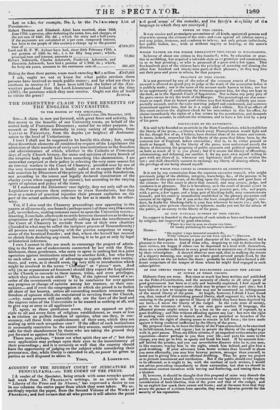THE DISSENTERS' CLAIM TO THE BENEFITS OF THE ENGLISH UNIVERSITIES.
TO THE EDITOR OF THE SPECTATOR.
Lincoln's Lan, 19th December, 1833.
Sin—A claim is now put forWard, with great force and activity, for free access to .the benefits of our University trusts, on behalf of the united body of Protestant Dissenters ; united for no other purpose, in- asmuch as they differ internally in every variety of opinion, froin CALVIN to PRIESTLEY, from the depths (or 'heights) of Antinomi- anism to the level of Unitarianism.
I trustIsbell not be supposed to be hostile this claim ; but, seeing these discordant elements all conibincd to require of the Legislature the adrnisiion of their members of every sort into institutions to the founders end administrators of which; whether .in the Catholic or Protestant days of early Church history, the name and opinions.of every branch of the irruptive body would havebeen something like abomination, I am somewhat surprised at their policy in selecting the very same season for an internal warfare in the Court of Chancery, presided over by one of the very Government which is loudly called on to support the whole- sale assertion by Dissenters of the principle of dealing with foundations, not according to the intent and legally declared constitution of the charity (even when supported by statute), but according to the varying spirit of opinion and policy of the times. If I understand the Dissenters' case rightly, they not only call on the Legislature to procure them entrance to these foundations, but they treat as a matter of practical injustice their present exclusion on the part of the actual authorities, who can by law as it stands do no other- wise.
. Yet, if I also read the Chancery proceedings now appearing in the papers at all correctly, one branch (perhaps more) of those very Dissenters (all, nevertheless, making common cause to open the University trusts= meaning, I conclude, afterwards to settle between themselves as to the ap- propriation of the privilege) is actually calling down the interference of the Court of Chancery to exclude from one of their own charities ,(founded in what may be called the incipient process of Nonconformity) all persons not exactly squaring with the precise sumpsimus or monk. simus of the heretical founder ; and that, where she herself has seemed to shrink from declaring any creed, leaving it to be got at only by legal .orlistorical inference.
I own I cannot in this see much to encourage the project of admit- ting to thefree use of endowments connected by law with the Esta- blishment, these gentlemen, who seem to agree in nothing but in a joint operation against institutions attached to another faith ; but who deny -to each other a community of advantage as regards their own institu- tions, and even, as it should seem, thg very title to introduction which might be involved in the terms" Chfistian" or " pious " men. And why (as an argumentum ad horninem) should they expect the Legislature or the Church to concede to them names, titles, and even privileges, which they refuse to each other ? Why, if the inferred intent of a se- ceder of the seventeenth century is to be conclusive for ever against any progress or change of opinion among her trustees, or their con- nexions,—and if even the congregation in which she joined is to forfeit all share of her bounty, unless all succeeding members renounce that freedom of opinion which she maintained in seceding from the Church, —why. some persons will naturally ask, are the laws of the land and the express rules of the Universities to be treated as nothing at all, and to give way at once to all applicants ? If, again, as these gentlemen avow, they are opposed on prin- ciple to all and every form of religious establishment, as more or less .a re .trietion on perfect freedom of opinion, what can they, in con- sistency, call these little establishments of their own, which they are sealing up with such scrupulous care? If the effect of such institutions is necessarily restrictive to the extent they assume, surely consistency calls for their abandonment by those who are taking the ground they put forward as against the Universities.• These men, perhaps, " know not what spirit they are of ;" but their own application may perhaps open their eyes to the inconsistency of their proceedings ; and it is certainly as well that the country should have the opportunity of judging on the subject while considering their pretensions, that, while liberty is extended to all, no power be given to parties so well disposed to abuse it.


















 Previous page
Previous page